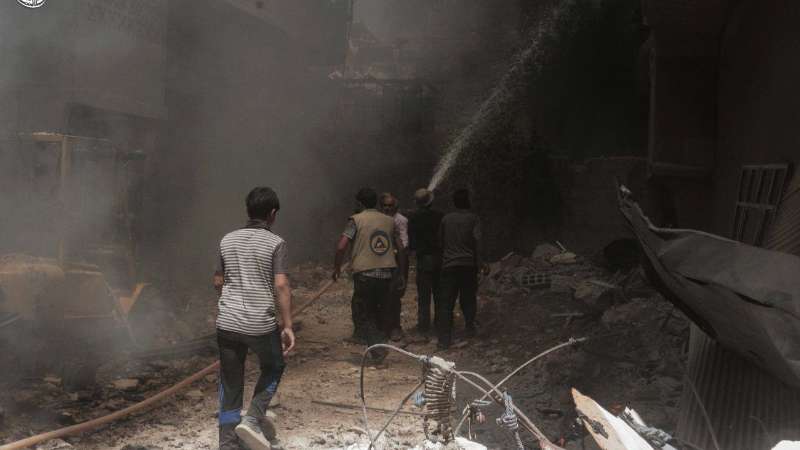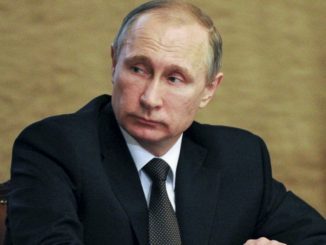
A truce in Syria brokered by Russia and the United States is set to begin at sundown on Monday, leaving the Syrian rebels under a hard choice after excluding a main fighting group from the agreement.
The agreement, made by US and Russia who back opposing sides in the five-year-old war, promises a nationwide truce from sundown on Monday, improved access for humanitarian aid and joint military targeting of hardline Islamist groups.
The Free Syrian Army group, a leading rebel alliance, said it would observe it from sundown on Monday as agreed, but with major reservations.
“The decision is taken,” the opposition source said, speaking on condition of anonymity. “In the next few hours there will be a statement where we state that, but there will be a lot of harsh reservations and observations regarding the whole package. But as a final takeaway, we do agree.”
The alliance wrote to Washington on Sunday, saying that while it would “cooperate positively” with the ceasefire, it was concerned that it would benefit the government of President Bashar al-Assad.
Another leading rebel group Ahrar al-Sham, which is seen as a “terrorist group” by Russia, rejected the deal, saying it would strengthen Assad’s government.
The terms of the deal mean that if the peace holds for about nine days, Syria’s air force will be sidelined and joint U.S.-Russian strikes will begin against militant groups that are banned from taking part in the truce – Islamic State and Jabhat Fateh al-Sham, which was until recently called the Nusra Front.
“Targeting Fateh al-Sham and treating it in a different way to the (Iran-backed) Shi’ite militia, and pushing us or expecting us to agree to a package where part of it is to bomb them, is going to create a lot of internal problems, and it’s already happening on the ground, and there’s a lot of tension,” the opposition source said.
“We want to cancel out any possibility of internal confrontation by clearly stating that we do not agree or endorse the idea of targeting Fateh al-Sham because the other side does have other groups that fit the designation criteria, but they are acting freely and with coverage inside Syria.”
Armed groups would continue to operate with Jabhat Fateh al-Sham, the opposition source said, because it was impossible to disentangle the forces that fought side by side.
“From our point of view it’s business as usual,” the source said, adding that it was unclear how the United States and Russia planned to cooperate on targeting the banned militants.
Syrian rebels
Syrian rebels surrounded
For the agreement to work, Russia will need to persuade the Syrian air force to stop strikes on anti-government positions, which have killed large numbers of civilians.
In turn, Washington has to get the opposition groups it backs to separate themselves from Jabhat Fateh al-Sham, which has allied itself with a range of rebels at different points in the fluid conflict.
Pro-regime forces have taken back a strategically important district on Aleppo’s southern outskirts, rolling back nearly every gain from a month-long rebel offensive there.
The Assad regime advance further sealed off Aleppo’s opposition-held eastern districts, and government troops backed by the Russian air force have completely encircled opposition-held neighbourhoods, leaving the civilian population completely cut off.
In another major blow to the rebels, the military commander of Jabhat Fateh al-Sham, the largest rebel alliance, was killed in an air strike, rebel sources said on Thursday.
“Rebels are now back to square one, under an even more ruthless siege,” Rami Abdel Rahman, head of the UK-based Syrian Observatory for Human Rights, told AFP news agency.
“The armed opposition in Syria now faces what is perhaps its biggest and most momentous decision since they chose to take up arms against the Assad regime in 2011,” said Charles Lister, a senior fellow at the Middle East Institute think-tank.
Mainstream rebels appear reluctant to withdraw from frontlines where Jabhat Fateh al-Sham fighters are also present because of fears the ceasefire will fail, he said. Syrian rebels
“For this reason alone, many opposition figures see the US-Russia talks and whatever comes from them as a conspiracy against their long and hard fought for revolution. It will be hard to change this mindset,” Lister added.
The Syrian crisis began as a peaceful demonstration against the injustice in Syria. Assad regime used to fire power and violence against the civilians and led to armed resistance. 450.000 Syrians lost their lives in the past five years according to UN estimates, and more than 12 million have lost their homes.



